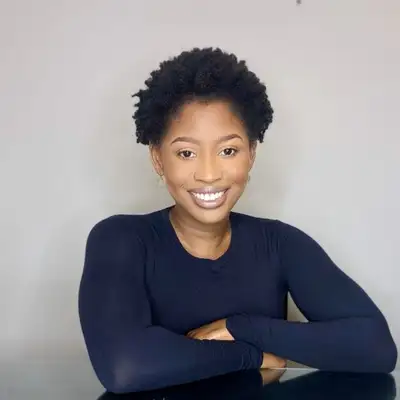Why Women’s Bodies Deserve More Science
Download MP3Philippa Abang
Hi lovelies, and welcome to another episode with the feminine dilemma. I am your host, Philippa, and I hope you have been well, and your week has been everything sweet and nice, if not, I'm sending you my condolences. So in this episode, we're going to be talking about female research and addressing all the hiccups in our path to success. Take, for example, the cut and reversal of funds towards the women Health Initiative, which sole purpose is to help bridge the gap in scientific research that has not been including women or female subjects for whatever odd reason, like, we don't make up 51% of the population. So without too much talking, let's dive straight in a fun fact. did you know that it wasn't until 1993 I know Yes, 1993 that women were fully integrated into federal funding of Health Research. Before then, we were treated as simply abnormal versions of men, men with uteruses and breast.
How ironic. Like we don't make set men in our own bodies, cell by cell, creating organs and functioning systems over nine freaking months. But let's take a step back and talk about the first major study to include more women than men. Was a fairing harm farringham Heart Study in 1948 this was conducted in the post world war two America. The war had left many men either dead or traumatized and unwilling to participate in long term research while while more women were mentally and physically available. So ironically, by accident, rather than design, women made up more of the subjects in this research. Ironically, this accidental representation gave us some of the earliest insight into cardiovascular health in women, and still, as recent as 2019 women made up about 40% of participants in clinical trials for the top three diseases that disproportionately affects us, which is cancer, cardiovascular disease and psychiatric disorders. Despite, again, we make up 51% of the population also hip replacements as well. Is another example. Women make up 60% of all hip replacements annually. But yet, in 2013 studies showed that women are 30% more likely to suffer complications from the procedure, including higher mortality rates 60% and somehow they haven't figured it out by now. This should have been like a smoke signal or something that went off so that they could realize that, Oh, something is off here. But spoiler alert, nothing happened. They didn't realize anything or take corrections from that. And let's not forget the thalidomide disaster of the 1950s so thalidomide was this drug which was created in Germany and was given as a nausea medication to women. And guess what? As of other examples, it was never tested on women or female animals of that sort. So it was given and recommended to pregnant women without proper safety trials. Think about it. It was never tested on women, yet women were the ones prescribed it, like total madness. And all the children that were born that their mothers were administered this medication came out look like the dolphin syndrome. Basically, they weren't developed properly that limbs didn't develop properly like normal babies. Then in 1977 the FDA responded, not by fixing the issue, but by excluding women of reproductive potential from early stage clinical trials altogether. And what does that term even mean? Like reproductive potential? Basically, any women between like 14 to 49 years old. I know. Yeah, 49 years old. Yeah, 49 years old. Women can get pregnant as well. I feel like our whole reproductive system has been lied to us for a long time, and that is the whole topic on a different day, like we're going to dive into that more another time. But you think about it, this is the also the group most uninformed and ignored when it comes to pain and symptoms, especially reproductive and hormonal disorders, a full freaking circle like, geez. So it wasn't until 2014 that the NIH finally addressed the lack of female test subjects in pre clinical research. So one of the primary objectives, I say objective objections, was that studying female animals was too complicated because of hormonal fluctuations. But isn't that like the entire point of research to see how biological processes interact with medication and stimuli? Like, isn't that their job to investigate all these loopholes and figure out how to bypass them, giving freaking excuses like why? And to think about it like things like aspirin, one of the most widely used drugs for like period pains and pain mitigation altogether, wasn't even tested for how it affects women. We're just winging it for so long. So all your dosages before 2005 were male dosages.
And they just like, slash them in half and be like, since women are like half men somewhat, just give them half of it. You know, they'll survive. They'll survive. It was until 2005
when they finally decided to include women in clinical trials. So freaking funny. And also, another big issue is like women of color as well have always been underrepresented in research and even less believed when it comes to reporting symptoms systematic biases and racism makes things even worse for people who don't fit the default male subject. So let's let me give you guys like a quick detour to this story I saw on Tiktok, I think last week, it was a black woman who went to the ER after she had her tonsil removed, and I think she had some complications that she needed help. But instead of, like, checking further and doing necessary tests, the attendant put in her chart that she was being violent. So when she went to the next hospital, she found out that that was what they labeled her as in her chart, when left the previous hospital that she was violent because she didn't want to, like sign some paperwork that they gave to her after she had complained that she was having issues with the aftermath of the surgery. Crazy, crazy, crazy. I feel like there's so many stories like this as well that show how black women and other women of other races are always getting second hand treatment in the hospital. Can you imagine you go in for pain, and then they turn you and say, Oh, she's a mad person. She's crazy. In better news, let's give flowers to some women who helped the NIH in 1993 to pass laws and make changes that helped impact women's research, like how women are treated when it comes to research subjects. So like Dr bernine, I may butcher some of the names. Dr Florence, Dr Vivian, Dr Ruth, Congressman Patricia, Senator Olympia and a bunch of feminist organizations. As you can see, I didn't say that last name is because, yeah, it was going to be a murder scene. So No, no, they demanded what should have been obvious, the federal funding research must include women, because when women are included, science get safer, more accurate and, frankly, more honest to be precise. So let's talk about like, things that change as a process of this 1993 law that was put in place. So Ambien, which is a popular sleep aid for years, men and women were prescribed the same dosages untill studies reveal that women metabolize it, metabolize the word is not my best friend, that women metabolize it more slowly, leading to next day drowsiness and accident. Can you just imagine how many women are taking ambience before then and might have gotten into accidents due to the fact that nobody tested to make sure that they were fine. Just imagine driving and then you just fall asleep on the wheel. Scary. It wasn't until 2013 that's when they decided to, like, do something about the dosages and fix their research. 2013 Can I imagine 20 years later, after the law was put in place? So like things like HIV, drugs, antidepressant, everything we know now about meds and how it works differently in women is thanks to that 1993 law, but it took decades, and too many women were misdiagnosed, over medicated or even killed, like who even freaking knows at this point. So like Dr Therma said, No man makes up pain, yet women wait longer times in ERs and I'm less likely to receive opioids and are more often told that symptoms are psychological. A 2022 study showed that women are 13% to 25% less likely to receive pain relief for the same symptoms as their male counterparts. I'm sure it still happens till today. Well, let's shift the topic to something that's more close to home, birth control. Think about it. The big one right now is IUD insertion. I think it has been all over Tiktok, Instagram, all the stream medias women have been talking about the experiences and sharing like things that should have been done better, women who have at least gotten better pain
medication and midigations to help the whole process of insertion better. So some doctors are definitely changing the way that the whole process is being done like you go there. It's literally inserted into your uterus, which is the whole very sensitive area. And most women are given no sedation, nothing. Basically, as it has been done for so many years at this point, no numbing, nothing. It's just like, oh, take a deep breath and you'll be fine. Just take a deep breath. And women are cramping, women are bleeding, women are some people say that they they felt like they're going to faint. Or some people say they fainted too. I've read, like, some stories on Instagram, and the rest of them women telling their story. I'm just like, wow. But like, men would get put to sleep just to get tattoos done. There was a video I saw about that. I was just like, wow. One of the quotes I really liked when I was doing my research was like, Doctor Jen and OBYN and the author of the vagina Bible, she said, If men needed IUDs, they'll be sedated. It is that simple, my sister, it is that simple. As simple as that, they always make sure men have like the best care. But women, who literally birth the whole world, are treated sub human and.
The crazy thing about it all, it's not like all this pain medication does not exist. There are things like lidocaine and the likes that exist, but rarely they are offered to women, like, until they ask for it. Like, who teaches you to ask for pain medication when you go to the hospital for an IUD insertion and like, is it in your care plan? Nope, it's not in your care plan. You just have to maybe ask for it. If you your mind even goes like, What are you even thinking about? You think about so many different things at that point, your mind really, never really goes into like an IUD that you need pain medication for an IUD insertion, because most of times, women do not know any other woman who have gotten IUD in this may be their first time getting to do this procedure, and nothing is get offered to them. And all that this does is just reinforce stereotypes and just you thinking that, Oh, maybe my pain is not that bad. Maybe it's all in my head like and then women tell their daughters, because these beliefs get passed on from generation to generation, where you say, Oh, I feel this way, that it's just normal, just how your body is, but no, your whole system is breaking down inside of you. We have made some small progress, but we are still far from equal. There's still a large gap that needs to be covered when it comes to things like endometriosis, PCOS, autoimmune diseases that affect women specifically, are basically underfunded. Some women are misdiagnosed, ignored. Heart disease, which is the number one killer of women still gets misread because we do not present like men, and when it comes to funding, a 2022 study showed that women based conditions, basically, research done on women's issues gets underfunded by billions, not millions people, billions of dollars. So basically, gender biases continue to shape what gets studied, how it gets studied, and who gets heard and to talk about policy setbacks also, as well, make it even worse under the Trump administration, funding cuts and executive orders roll back access to reproductive care and research, so the reinstated Hyde amendment and Executive Order 14182,
courts federal funding for abortion services. So think about this, two different orders, like two different brothers. So Hyde is like the stingy one that wants to give you half a slice of pizza while Executive Order 14182, wants to give you the whole pizza. So the pizza so the pizza will be your healthcare, basically. So Hyde is like, um, just give her one ibuprofen. She'll survive. You know, it's not that serious of pain. And then 14182, is like, No, I think she needs ibuprofen, the whole bottle, a pack of an ice pack, some follow up, maybe more ibuprofen if she needs, maybe escalate it to make with different medication. If the ibuprofen doesn't work. You know, it's so crazy sometimes to think about, you need a different order to help, kind of push the hand of the other one to do what is right by the people. Like, why should we be having such a discussion or having to make such rules and orders to sway or change previous ones that are already in place. Others like the title 10 clinics have lost funding, living low income and rural women without contraception, cancer screening and prenatal care. Immigrant women face new barriers to reproductive health. LGBTQ plus women have lost access to inclusivity care. Also, there was news I heard about, like HIV medications, and how the is that going to be like a ban, or there's going to be like a shortage, or some other thing that has to do with its ability to get to the patients that need them effectively? There's going to be like a whole supply and demand issue, and black women, as we already know, are at higher risk of maternal death. To think about a black women are two to six times more likely to die from birthing compared to their white counterparts. This is a whole topic on its own, like birth. Childbirth is the oldest medical condition known to man, but somehow, in the year of our Lord, women are still dying from giving birth and somebody want us to have more babies. I know guys, this sounds very disturbing, but it gets better, or does it never get better? Or where it gets better, it gets better, trust me, so organizations like the Society for women, health research, Planned Parenthood, women Health Access matters, the endometriosis Foundation of America and a bunch of other firm, tech and startup, are all pushing forward to make sure that we get access to the right research and funding. They are creating new diagnostic tools, lobbying for laws and educating the public. They are refusing to let our health be an afterthought. Quick Talk on lobbying. Am I the only one who thinks that lobbying is kind of like bribery and corruption in a way, like you having to pay or do something that the Congress person wants in order for them to support your vote for change that literally benefits their constituents? So if you are listening and you ever felt dismissed, overlook, or told your pain wasn't that bad.
You are not alone, you are not exaggerating, or you are not broken. You are living in a system that wasn't built for you, but together, we can change it, because our bodies deserve better, because our pain is real, and because science without women is not science at all. We are literally the creators of life. Never forget that, and that brings me to the end of today's conversation. If you have any comments, concern or discussions or just want to keep the conversation going, leave a comment down below. And I hope you have an amazing rest of Your week until next week or next Time Bye.
Transcribed by https://otter.ai
Creators and Guests


